
Which fruits should pregnant women eat? Most pregnant women have the same question that which fruits to eat during pregnancy is better and better for their health. Healthy eating is important for women when they are pregnant. Their diet will provide the fetus with essential nutrients for growth and development. In this article, you will know which fruits should be eaten by pregnant women and also we will tell which fruits should not be eaten during pregnancy. So, see below 15 fruits to eat during pregnancy.
Table of Contents
Benefits of Eating Fruits To Eat During Pregnancy:
Eating a healthy, varied diet is especially important during pregnancy because the right nutrients help the fetus develop and grow. In addition to nourishing the growing baby, consuming vitamins and minerals can help a pregnant woman keep her body in optimal condition. Consuming more fresh fruits during pregnancy can help ensure that both the woman and the baby stay healthy. Fresh fruit contains many essential vitamins and nutrients and is also a good source of fiber.
Most women know that a healthy diet should include plenty of fruits, vegetables, whole grains, protein, and healthy fats. However, they do not know which fruits are particularly beneficial during pregnancy.
In this article, we will tell you why it is important to eat fruits during pregnancy. Which fruits should pregnant women eat, we will also tell which fruits are best to eat during this time, and which fruits should be avoided by pregnant women. What fruits should pregnant women eat?
Best Fruits To Eat During Pregnancy:
Pregnancy is one of the most important and sensitive times in a woman’s life. Therefore, it is very important for pregnant women to eat a healthy diet. A nutritious diet plays an essential role in a woman’s overall health, helping the body function effectively and reducing the risk of diseases.
Let us know which are the best fruits to eat during pregnancy. Consuming fruits can be a great way to reduce sugar intake during pregnancy. Below, we list the best fruits to include in a healthy pregnancy diet. Let us know which fruits pregnant women should eat.
(Also Read: Essential Sexual Hygiene Tips For Women After Sex)
Banana:
Banana is a superfood for pregnant women. They are high in calcium and potassium, which may help prevent nighttime leg cramps. You can choose bananas to meet your specific nutritional needs. Keep in mind, always eat ripe bananas only. If you have gestational diabetes, eat bananas only after consulting a doctor.
Bananas contain high levels of vitamin C, potassium, Vitamin B6, and fiber. The high fiber content of bananas can help cure pregnancy-related constipation, as can vitamin B6 helps relieve nausea and vomiting in pregnancy.

Avocado:
Eating avocado is very beneficial for pregnant women. Avocados are an excellent source of vitamins C, E, and K, monounsaturated fatty acids, fiber, B vitamins, potassium, and Copper. Avocados contain healthy fats that provide energy and help prevent neural tube defects. They also give a boost to the cells responsible for building the skin and brain tissue of the developing baby.
The potassium present in avocados can provide relief from leg cramps during pregnancy, another symptom that is common during pregnancy, especially in the third trimester.
Guava:
Guava contains vitamin E and folate, making it an ideal fruit to eat during pregnancy. Guava is an excellent choice of fruit for pregnant women for the following nutrients Vitamin C and E, polyphenols, carotenoids, isoflavonoids, and folate. Guava has a diverse combination of nutrients, which makes it an ideal fruit for pregnant women. Eating guava during pregnancy can help to relax muscles, aid in digestion, and reduce constipation.
(Also Read: What Is Your Vaginal Discharge Saying About Your Health?)
Apple:
Apple is not only one of the safe fruits but also one of the most important fruits to consume during pregnancy. It boosts your child’s immunity and strength. These help reduce the risk of asthma and eczema as your child grows up. Apples are rich in nutrients and contain vitamins A, E, and D as well as zinc.
Apples are known to be packed with nutrients to help the growing fetus, including vitamins A and C, fiber, and potassium. One study found that eating apples while pregnant may lower the child’s chances of developing asthma and allergies over time.
Kiwi:
Kiwi is rich in vitamins C, E, and A, potassium, phosphorus, magnesium, folic acid, and dietary fiber. Kiwi benefits the respiratory system. They can also prevent an expectant mother from getting a cold or cough. They are high in phosphorus and aid in the absorption of iron. Kiwi also reduces the risk of blood clotting.

Berries:
Eating berries is very beneficial for pregnant women. Pregnant women will get the following nutrients by consuming berries: Vitamin C and K, folate, antioxidant, and fiber. The nutrients in grapes may help support the biological changes that occur during pregnancy. They contain immune-boosting antioxidants like flavonols, tannins, linalool, anthocyanins, and geraniol, which also help prevent infection.
(Also Read: How And When To Use Abortion Pill?)

Orange:
Oranges and other citrus fruits are rich in Vitamin C. This vitamin is essential for the formation and development of the baby’s bones and teeth. Vitamin C also helps in the absorption of iron, which is an important mineral for the body. Most importantly, Vitamin C is an antioxidant that protects against free radical damage.
Oranges are excellent sources of folate, vitamin C, and Water. Oranges are one of the best fruits to eat during pregnancy to keep the pregnant woman hydrated and healthy. The vitamin C present in oranges can prevent cell damage and aid in the absorption of iron.
Folate may help prevent neural tube defects, in which brain and spinal cord abnormalities can occur in a baby. Neural tube defects can lead to conditions such as spina bifida, where the spinal cord does not develop properly, and anencephaly, in which a large part of the brain and skull is missing. To avoid all these problems, oranges should be consumed during pregnancy.
Apricot:
Apricots are high in folic acid, calcium, potassium, and magnesium, among other vitamins and minerals. Dried apricots are high in iron and fiber, which help in increasing red blood cells. They regulate the digestive processes, which is beneficial for you during pregnancy.
Apricots contain vitamins A, C, and E, calcium, Iron, potassium, beta-carotene, phosphorus, and silicone. All these nutrients help in the development and growth of the baby during pregnancy. Iron can protect a pregnant woman from anemia (lack of blood) and calcium helps strengthen bones and teeth.
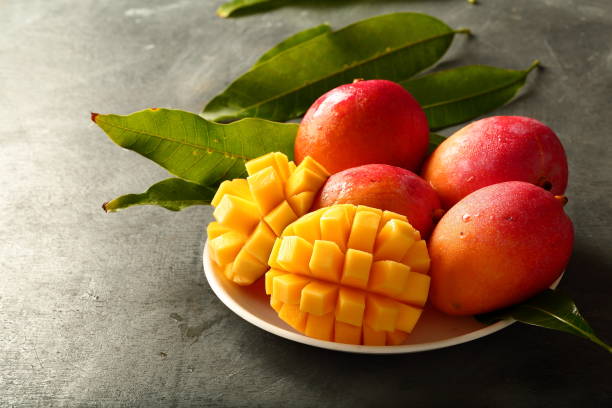
Mangoes:
Eating mangoes is very beneficial for pregnant women. Mangoes are rich in vitamins A and C. One cup of sliced mango provides pregnant women with 100 percent of their recommended daily intake (RDA) of vitamin C and more than one-third of their recommended daily intake of vitamin A.
A baby born with a vitamin A deficiency may have lower immunity and a higher risk of postpartum complications, such as respiratory infections. That’s why pregnant women should eat mango fruits.
(Also Read: Easy And Best Exercises For Tight Vagina)
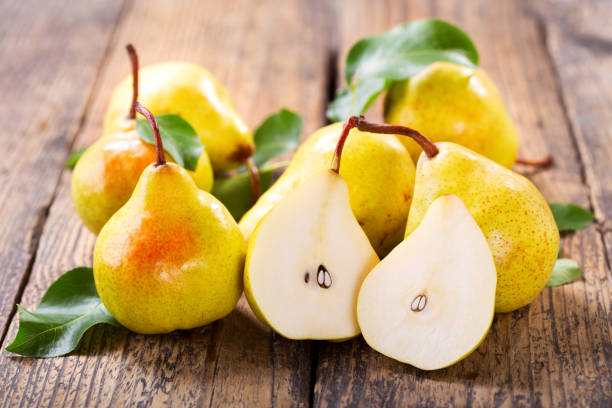
Pear:
Eating pears is very beneficial for pregnant women. Pears provide the following nutrients fiber, potassium, and folate. Eating plenty of fiber in a pregnancy diet can help reduce constipation, a common pregnancy symptom. Potassium can benefit heart health for both the woman and the baby. It also stimulates cell regeneration. Vitamins, minerals, folate, etc. are present inside the pear, which can not only provide relief from the problem of anemia, but the vitamin C present inside the pear is also useful for the health of the child.
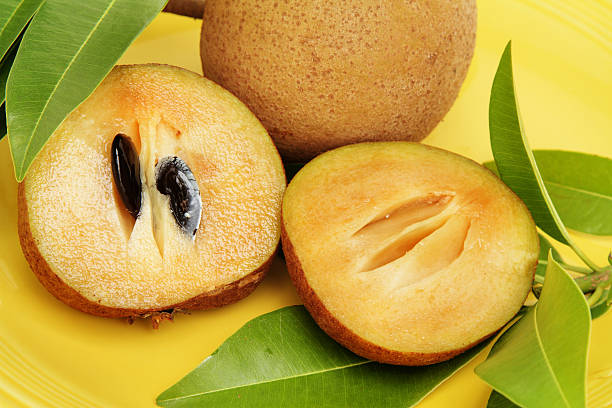
Chiku:
Mouth-watering on hearing the name Chiku. In such a situation, tell pregnant women that they too can include chiku in their diet. Carbohydrates and essential nutrients are present inside Chiku which are very beneficial for women. Apart from this, if women are troubled by the problem of weakness, vomiting, or nausea during pregnancy, then this problem can be overcome by consuming chiku.
Watermelon:
Watermelon is as delicious in taste as it is useful for health. In such a situation, pregnant women can also add watermelon to their diet. Watermelon contains essential nutrients such as iron, zinc, calcium, vitamin C, etc., which are useful in the development of the fetus as well as women. If there is an impact on the weight of the baby during pregnancy, then the consumption of watermelon can reduce the risk of not gaining weight.
(Also Read: Early Symptoms Of Pregnancy: How To Detect?)
Cherry:
Red, sour-sweet cherries bring relief to many women from morning sickness and bad mood. At the same time, these small fruits also protect you from common diseases like colds and coughs by increasing immunity during pregnancy. Consuming Cherries during pregnancy leads to a proper supply of blood to the placenta and fetus. Melatonin is also found in cherries. It is an antioxidant that not only boosts immunity but also reduces the problem of sleeplessness.
Cherries can prove beneficial for women during pregnancy. There is a lot of fiber present in it. Apart from this, many vitamins and minerals are also present inside the cherry. In such a situation, women can benefit greatly from its use. Blood sugar levels can be controlled by consuming cherries.

Pomegranate:
Pregnant women must eat pomegranate during pregnancy. Pomegranate can provide pregnant women with plenty of Vitamin K, calcium, folate, Iron, protein, and fiber. Nutrient-rich pomegranates are also a good source of energy, and their high iron content helps prevent iron deficiency. Vitamin K is also essential for maintaining healthy bones during pregnancy. Research suggests that drinking pomegranate juice may reduce the risk of placental injury.
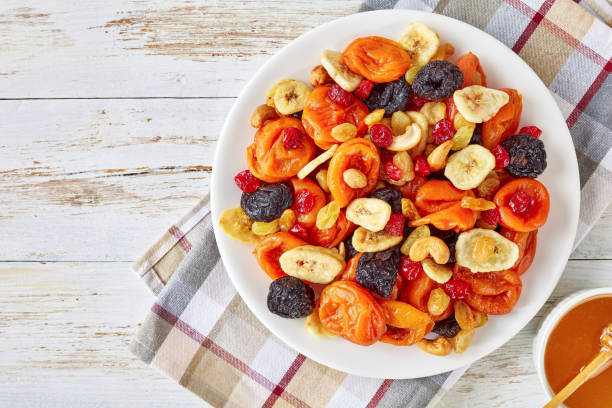
Dry Fruit:
Dry fruits or dry fruits contain the following nutrients: fiber, vitamins and minerals, and energy. Dry fruits contain all the same nutrients as fresh fruits. Therefore, pregnant women can get their vitamins and minerals by eating dried fruit that contains less than the equivalent amount of fresh fruit.
However, it is important to remember that dried fruit can be high in sugar and may not contain the water content that fresh fruit does. This means that they do not aid in digestion. Pregnant women should eat dry fruits only in moderation.
Fruits You Should Avoid During Pregnancy:
Certain Fruits During Pregnancy Here are some fruits that should not be eaten by pregnant women as they can affect the pregnancy in one way or the other. Such fruits may include papaya as it can cause miscarriage and sometimes grapes as they contain a compound called resveratrol which aggravates the hormonal imbalance during pregnancy.
According to the gynecologist, Fruits are always healthy and nutritious. But there are some fruits that should not be consumed during pregnancy as they can have negative effects on the fetus. Here are some fruits that pregnant women should avoid, as suggested by experts:
(Also Read: Menstruation And Hygiene! How To Maintain)

Pineapple:
Although pineapple is a super healthy fruit, it should not be eaten by pregnant women. It contains a rich amount of bromelain which can cause softening of the cervix which can induce early labor. Also, eating too much pineapple can lead to stomach problems like diarrhea, resulting in dehydration.
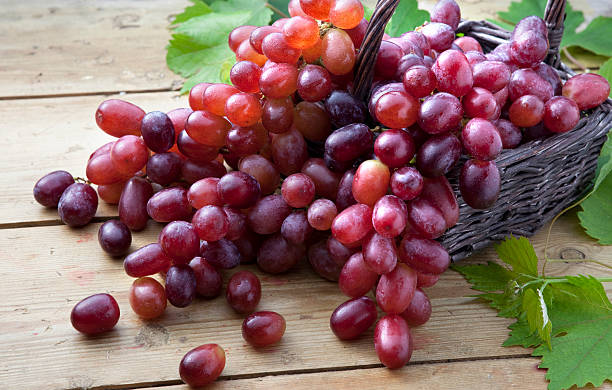
Grape:
Grapes have heat-producing properties, which can affect both the mother and the baby. It is also the presence of a compound called resveratrol, which is known to aggravate the hormonal imbalance during this pregnancy.
Women may also feel discomfort due to the consumption of grapes. In such a situation, women must take expert advice once before adding grapes to their diet. Explain that resveratrol is present inside the grapes, which can obstruct the effect of blood in the fetus.

Papaya:
Papaya is one of the most common fruits not to be eaten during pregnancy which is a taboo in this list. Papaya is said to promote early labor and, in the worst case, miscarriage. Papayas which are usually unripe and semi-ripe are believed to be rich in latex which is known to trigger uterine contractions.
(Also Read: How To Control Mood Swings in Pregnancy)
Conclusion:
Include more and more fruits in your pregnancy diet. Fruits are an excellent source of nutrients that are essential during pregnancy. Fruits can provide vitamins, folate, fiber, and more, which help in keeping the pregnant woman and the baby healthy. These nutrients can also help relieve some of the common symptoms of pregnancy.
Pregnant women should consume at least five different fruits and vegetables each day. The fruits mentioned in this article are especially good choices to eat during pregnancy. Apart from these, you can also eat other fruits. Pregnant women should also limit their intake of dry fruits and fruit juices as they can be higher in sugar and calories than fresh fruits. Talk to your gynecologist and nutritionist to change your diet plan to give birth to a healthy baby.



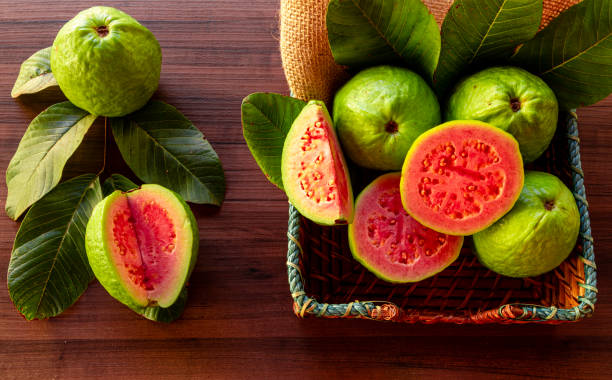


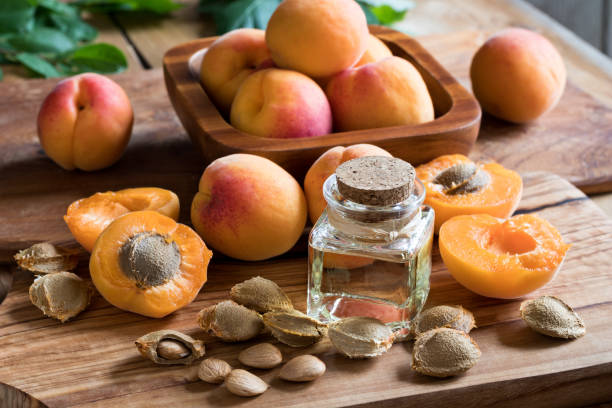

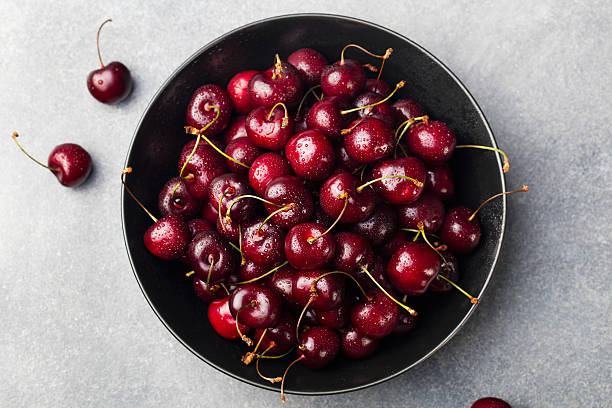
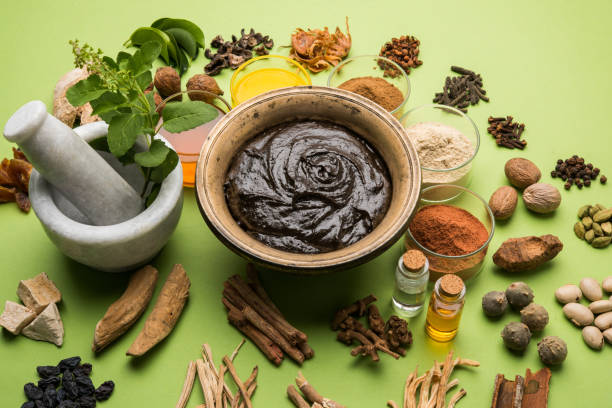







Leave a Comment